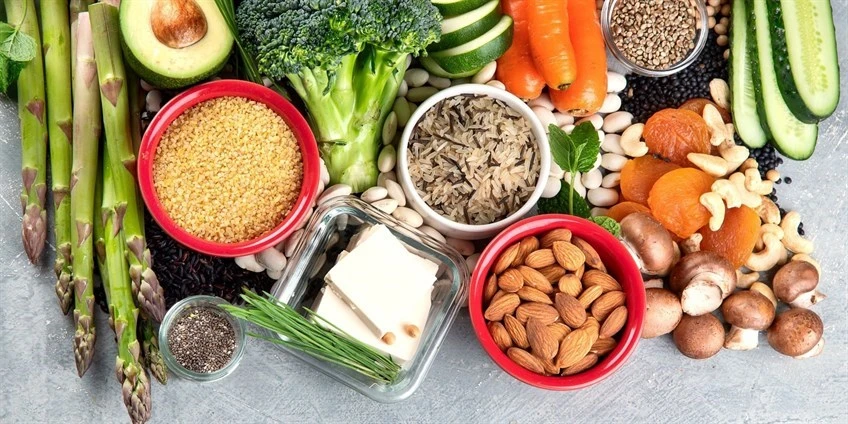Ensuring you’re getting enough good quality protein into your diet is crucial – we are literally built of protein, but was is the function of protein in the body? We need this for our physical structure and strength, to repair damaged/worn-out cells and to produce hormones, which control hundreds of processes within the body and have a huge impact on how we think and feel. Current daily guideline amounts for adults is 50g of protein.
Protein is made up of amino acids. There are 20 amino acids – some we can synthesise ourselves, but there are 9 that we can’t produce (hence the term “essential” amino acids). It’s therefore vital we obtain these from food sources. The essential amino acids are valine, isoleucine, leucine, methionine, lysine, phenylalanine, threonine, tryptophan and histidine.
Animal sources of protein contain all the essential amino acids, so are termed “complete protein” sources. However, vegans can struggle, as there are fewer plant-based “complete” protein sources, so let’s start by looking at these in more detail and how to overcome this hurdle.
“complete” plant-based protein sources
Chia seeds:
Protein Content: 20.7g per 100g
Although the protein content isn’t as high as some other vegetarian sources, chia seeds pack a huge nutritional punch. They’re an incredible fibre resource with nearly half (11 g) of the amount you need every day in a single ounce – which helps keep you fuller for longer and aids digestive health. They also contain nearly a 1/5th of your daily calcium requirement (more than triple that of milk), which aids heart health and strong bones. Chia seeds have no flavour, and unlike flax, chia seeds don’t need to be ground in order for your body to absorb all the nutrients.
Quinoa and Amaranth both contain 18 amino acids, so are regarded as “complete” proteins, so good protein choices for vegans. They are also both gluten-free so an easily digestible protein choice.
Quinoa:
Protein content: 14.1g per 100g
This light nutty grain is easy to prepare and versatile – use it as you would rice or couscous, so adding roasted vegetables and fresh herbs works really well. Ready cooked packs of quinoa are available in many supermarkets now. There are various different types of quinoa – nutritionally I’d choose red quinoa, which packs a punch by containing excellent levels of fibre.
Amaranth:
Protein content: 14g per 100g
Having a robust, earthy flavor, this works well with dishes involving spices. This grain tends to be sticky, so it makes a good thickener for soups and stews. Amaranth can also be cooked as porridge.
PEA PROTEIN POWDER:
70-80g per 100g (depending on brand)
Peas are one of the few plant-based options to contain all the essential amino acids so a good quality pea protein powder is a good option to consider adding to smoothies/soups/stews to improve the protein content.
SPIRULINA:
Protein content (dried): 57g per 100g
As well as containing all the essential amino acids, this edible algae is easy to digest and an excellent source of minerals. Two tablespoons of spirulina provides a protein substitute for a meal, so this powder is ideal to add to soups/stews/smoothies.
However, vegans can get more variety of protein sources by creating “complete” proteins. Some foods contain insufficient levels of essential amino acids, but when combined with others that contain higher levels, they become “complete” containing all the essential amino acids.
Combining grains and legumes is a good way of achieving a complete protein, for example:
- Rye bread with peanut butter
- Brown rice with butter beans
Or combining nuts, seeds and legumes will also achieve complete protein status, for example:
- Hummus – contains the combination of chickpeas and tahini (sesame seeds)
- Lentils mixed with almonds
- Mixed nuts, seeds and peanuts
Get the idea?
So let’s put this into practice with some healthy snacks ideas that contain complete proteins:
- Brown rice cakes with butterbean puree (butterbeans, small clove of crushed garlic plus fresh chopped parsley in a processor and whizz up to form a puree
- Rye crackers with organic peanut butter (most organic versions contain no added sugar)
- ½ small avocado topped with hummus
As with all food choices, varying protein sources is a good tip to follow to ensure wide nutritional content for overall good health.
Looking for a new Protein Powder? Check out Pulsin’s wide range of plant based and whey protein powders here to find the best one to suit you.

Shirley Ward
I am a registered Nutritional Therapist with nine years clinical practice experience, am a member of the British Association of Nutritional Therapists (BANT) and registered with the Complementary and Natural Healthcare Council (CNHC). I’m passionate about promoting the role of nutrition in improving and maintaining health and truly believe “you are what you eat” – fuelling yourself properly is a key factor for improving and maintaining health.

